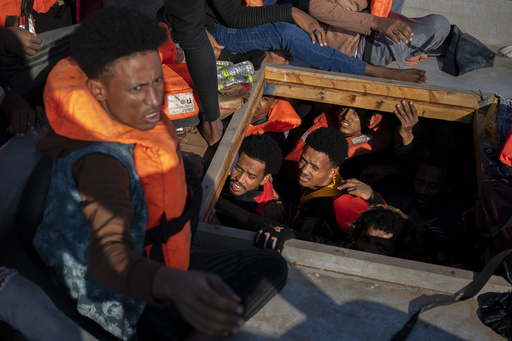BRUSSELS — On Friday, European Union nations reached an agreement on a proposed law aimed at combating migrant smuggling. This legislation has drawn criticism for its potential to target individuals or charitable organizations that provide assistance to migrants in need.
The new law is designed to expand the definition of migrant smuggling and impose harsher penalties, including increased prison terms and fines. The consensus among the 27 EU nations establishes their stance for further negotiations with the European Parliament regarding the proposed legislation.
Hungarian Justice Minister Bence Tuzson, representing a country currently holding the EU presidency, emphasized the importance of this initiative, stating, “To genuinely safeguard our borders, a more rigorous approach to tackling migrant smuggling is essential. Uniformly criminalizing this offense across the EU will be crucial in this endeavor.”
Last year, approximately 380,000 unauthorized crossings were reported at the EU’s external borders. According to Europol, a police agency, over 90% of the migrants arriving on European shores have relied on smuggler services.
The proposed legislation mandates that all member states must classify it as a crime for anyone to intentionally aid a migrant in entering, traversing, or residing in the EU for “financial or material gain.” Those convicted of smuggling could face imprisonment of up to three years, escalating to more than ten years in cases involving fatalities.
Organizations and their representatives implicated in smuggling could incur penalties of up to 40 million euros (approximately $42 million). Notably, the draft includes a “humanitarian clause” that asserts certain assistance to irregular migrants, such as aiding family members or providing essential needs, may not be classified as migrant smuggling; however, this clause is not legally binding on member states.
The Platform for International Cooperation on Undocumented Migrants (PICUM), advocating for migrant rights and representing 160 organizations, has expressed apprehension about the voluntary nature of this clause, which could lead to increased legal actions against migrants and their supporters.
Marta Gionco, a senior advocacy officer at PICUM, remarked that the draft law appears to lean toward increased criminalization, predicting more individuals will face legal repercussions, fines, and imprisonment simply for offering assistance. Some migrants have been charged as smugglers for piloting the boats from which they are rescued.
In 2022 alone, at least 117 individuals were subjected to legal processes for aiding migrants, alongside another 102 in the previous year. Charges ranged from rescuing migrants in distress at sea to providing them with food, shelter, water, or clothing.
Italy has notably intensified its legal crackdown on NGOs alleged to be encouraging migration to its shores by utilizing vessels to search for migrant boats in trouble across the Mediterranean. In recent years, Italian authorities have confiscated and detained charity-operated ships on numerous occasions.
The justifications for these detentions, which can last for weeks or even months, include accusations of “aiding and abetting illegal migration” as well as less severe allegations such as violations of maritime safety regulations or improperly managing waste.
One instance involved a ship being held for responding to migrant mayday signals while transporting rescued individuals to safety, while another was grounded for “overloading” following a rescue operation. Additionally, an NGO aircraft was prohibited from flying due to exceeding its operational hours at sea.
